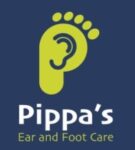Frequently Asked Questions
Please contact Pippa if you cannot find an answer to your question.
Clinic appointments are provided on Mondays at The Spiro Clinic, Ludlow, SY8 1RT and on Thursdays & Fridays at Lingen Village Hall, north Herefordshire, SY7 ODY. Pippa will carry out some home visits for housebound clients on her non-clinic days. All home visits must be arranged by phone.
It really depends on what difficulties you are having. The majority of foot care clients tend to book appointments every 6-8 weeks. Clients who have ear wax removal tend to book in either quarterly, 6 monthly or yearly depending on how much difficulty they have with impacted wax.
This also depends on the individual’s treatment. However, on average, ear wax removal appointments are 30 minutes and foot care appointments are approximately 40-45 minutes.
Yes. If you are having an ear wax removal appointment please use Earol olive oil spray twice a day for a minimum of 3 days prior to the appointment. This allows the wax to soften and make it comfortable to remove. You can obtain the drops/spray from your local chemist. The following are not recommended: hydrogen peroxide based drops (e.g ‘otex‘ express) or kitchen olive oil.
A small percentage of clients (1 in 10 approx) that require ear wax removal need more than one session to remove impacted wax. By using drops, as described above, it reduces the likelihood of you needing more than one session to remove the wax as it softens it and draws it away from the ear drum. Please note that there is a charge for follow up appointments. If you’re unsure if you require wax removal please book into our ear check appointment slots (see below).
Microsuction is where wax is removed using very low pressure suction. A digital view of the ear canal enables the clinician to clearly see the wax as it is being removed. Microsuction is gentle on the ear canal and does not involve putting water into the ear. Microsuction can sound a bit noisy whilst it is performed. You may also notice a slight pulling sensation as the wax comes out of your ear. We also occasionally use sterile manual instruments and water methods of ear wax removal such as irrigation.
Every week we offer 20 minute slots (£25) at each of our clinics for those who are not sure if they need wax removal. This includes an optional hearing check.
Pippa can remove impacted wax and assess the health of the outer ear followed by a hearing test screen. However it is outside her scope of practice to diagnose a hearing loss or prescribe hearing aids. The results of the hearing screen may indicate you need to visit your GP or an audiologist for further investigation. This may be needed to see what the cause of any hearing loss may be and whether you require an audiology referral or whether the hearing loss is temporary.
For your foot care appointment please remove nail vanish as this can damage the tools used and also make it more difficult to assess your feet thoroughly. If your nails are very thick it can be of benefit to soak your feet in warm water prior to your appointment.
A Chiropodist – or the more modern term ‘Podiatrist’- receives degree level training and is able to treat conditions of the whole leg and not just the foot. Podiatrists have access to local anesthetics and are able to provide more advanced services such as specialist orthotics, or advice on problems you may have with ligaments, tendons and bones.
Foot Health Practitioners are trained to diploma level and carry out more routine treatment. This includes conditions such as fungal nail infections, corns and calluses. Any advice on footwear and orthotics is more general in nature. Foot Health Practitioners also often work with those who are diabetic to maintain healthy foot care and watch out for any complications. Foot Health Practitioners use information about a client’s medical history, a neuro-vascular assessment and their understanding of foot anatomy and conditions to inform treatment.
Pippa trained with the SMAE Institute which is the only course in the UK currently offering a university accredited diploma course. Pippa is trained to know when to refer or signpost onto other specialists such as the GP/Podiatrist if conditions are outside her scope of practice.
Yes. We are unable to provide warm wax therapy if you have broken skin, varicose veins, major vascular disorders and sensory neuropathy. Considerations and medical advice may also need to be taken if you are pregnant or receiving cancer treatment. Do call us to discuss your personal medical needs.
Payment is accepted in cash, by card, or by cheque. To ensure the efficient management of clinical services and the fair allocation of appointment times, appointments that are missed or cancelled with less than 48 hours’ notice will incur a £25 charge, except in exceptional circumstances. All online bookings require a £25 deposit, which is refundable only if a minimum of 48 hours’ notice of cancellation is provided.
